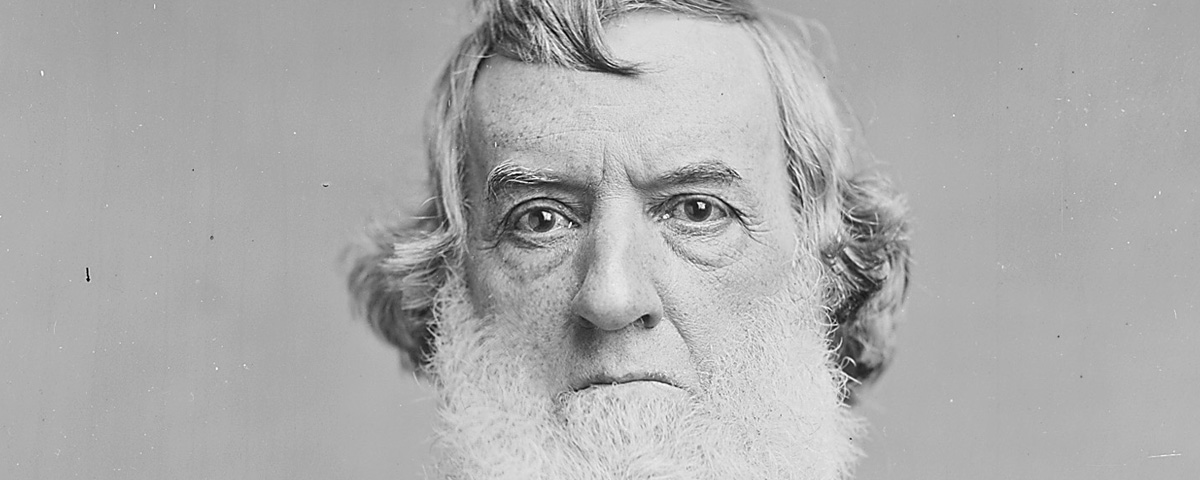Father Neptune’s War:
Gideon Welles’ diary offers frank, real-time insights from the center of power.
Gideon Welles was 59 when he became Abraham Lincoln’s Secretary of the Navy in March 1861. With a long white beard, and wearing a full wig that covered his bald pate, Welles stood out as a memorable figure who soon won Lincoln’s admiration and the affectionate nickname “Father Neptune.” During the war, Welles oversaw the Navy’s growth from fewer than 9,000 sailors and officers and 50 vessels on active duty to more than 50,000 men and 650 ships. He took an active role in strategic planning including naval and combined operations along the 3,500-mile-long Confederate coast, on rivers from the Mississippi to the James, and on the oceans. Lincoln paid tribute to the Navy’s role in fashioning victory when he wrote: “Nor must Uncle Sam’s Web-feet be forgotten. At all the watery margins they have been present. Not only on the deep sea, the broad bay, and the rapid river, but also up the narrow muddy bayou, and wherever the ground was a little damp, they have been, and made their track.” Welles put his imprint on virtually every aspect of the naval operations Lincoln applauded and must be reckoned among the best secretaries of the Navy in U.S. history.
He also ranks among the most important American diarists. Welles began making entries in August 1862 and continued through the early summer of 1869. During the war, he observed events from the center of power, where he participated in Cabinet meetings, interacted with influential people and developed a strong relationship with the president. His comments about Cabinet members, military commanders and other topics carry special weight because he usually recorded them almost immediately rather than waiting and trying to recall what had happened. Welles’ diary is essential to a full understanding of Lincoln’s administration and the Union war effort, more revealing than Salmon P. Chase’s journals or Edward Bates’ diary.
Two unsatisfactory three-volume editions of Welles’ entire diary appeared in 1911 and 1960. The first is profoundly flawed because of how sloppily (and silently) the editors assembled the text from wartime entries and later revisions and additions (it is not clear who did the editing); the second, prepared by Howard K. Beale, superimposes editorial symbols and proofreader marks on the text of the 1911 edition and is confusing and hard to use. I have consulted Beale’s version extensively and been frustrated every time.
Happily, a new edition of Welles’ wartime diary appeared in 2014. Edited by William E. Gienapp and Erica L. Gienapp under the title The Civil War Diary of Gideon Welles: Lincoln’s Secretary of the Navy, it marks a milestone in the published primary literature. Meticulously faithful to the original document, it renders sections in both earlier editions entirely irrelevant (except perhaps to specialists charting changes between the original manu- script and the 1911 and 1960 sets).
How good is Welles as a witness? I’ll close with several examples. On September 22, 1862, Lincoln raised the topic of his preliminary proclamation of emancipation with the Cabinet. “It is momentous both in its immediate and remote results,” Welles commented, “and an exercise of extraordinary power which cannot be justified on mere humanitarian principles, and would never have been attempted but to preserve the national existence….For myself the subject has from its magnitude and its consequence oppressed me, aside from the ethical features of the question….There is in the free states a very general impression that this measure will insure a speedy peace. I cannot say that I so view it.”
On July 14, 1863, Welles and Lincoln discussed George G. Meade’s failure to strike the Army of Northern Virginia before it retreated across the Potomac after Gettysburg. Leaving a Cabinet meeting, Welles recalled: “We walked together across the lawn and stopped and conversed a few minutes at the gate. He said with a voice and countenance which I shall never forget, that he had dreaded yet expected this—that there has seemed to him for a full week, a determination that Lee should escape with his force and plunder, and that, my God, is the last of this Army of the Potomac. There is bad faith somewhere….What does it mean, Mr. Welles—Great God what does it mean?”
In the summer of 1864, Welles wrestled with how harshly the war should be prosecuted. “I have often thought that greater severity might well be exercised,” he observed, “and yet it would tend to barbarism. No traitor has been hung—I doubt if there will be, but an example should be made of some of the leaders….Were a few of the leaders to be stripped of their possessions, and their property confiscated—their families impoverished, the result would be salutary….But I apprehend there will be very gentle measures in closing up the rebellion. The authors of the enormous evils that have been inflicted will go unpunished—or will be but slightly punished.”
On April 10, 1865, Welles celebrated the news from Appomattox: “This surrender of the great rebel Captain and the most formidable and reliable army of the Secessionists virtually terminates the rebellion.” He added, “Called on the President, who returned last evening, looking well and feeling well.” On April 14, Lincoln told the Cabinet that reconstructing the Union “was the great question now before us, and we must soon begin to act. Was glad Congress was not in session.” Welles next saw Lincoln slipping toward death at the Petersen House.
Gary Gallagher is the John L. Nau III Professor in the History of the American Civil War, University of Virginia; and author of Becoming Confederates: Paths to a New National Loyalty. This article was originally published in the August 2015 Civil War Times.





